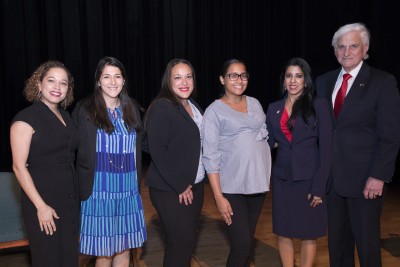NSU Newsroom
SharkBytes
Horizons
This version of NSU News has been archived as of February 28, 2019. To search through archived articles, visit nova.edu/search. To access the new version of NSU News, visit news.nova.edu.
This version of SharkBytes has been archived as of February 28, 2019. To search through archived articles, visit nova.edu/search. To access the new version of SharkBytes, visit sharkbytes.nova.edu.
Dr. Kiran C. Patel College of Allopathic Medicine to Launch Healthy Eating Education Program for Caribbean Population

Members of the project team from left to right: Regine Kanski, division director, Broward Regional Health Planning Council; Dr. Angelika Schlanger, public health specialist, UF/IFAS Extension Family Nutrition Program; Alyssa K. Eason, director of student licensing and credentialing, NSU MD; Kristen Sooklal, program coordinator, NSU MD; Dr. Farzanna S. Haffizulla, assistant dean for community and global health, NSU MD; George L. Hanbury II, President and CEO, NSU
Broward County has the fourth largest population of Caribbean immigrants in the United States, with approximately 255,600 individuals from different island nations who speak a variety of languages and have diverse cultural health beliefs and practices. With poor nutrition as a contributing factor, many of these individuals are at risk of obesity, which can result in major health complications such as diabetes, heart disease, hypertension, and stroke.
The NSU Dr. Kiran C. Patel College of Allopathic Medicine (NSU MD) is partnering with several community organizations to develop a targeted, culturally appropriate educational communication campaign focused on improving nutrition among the Caribbean immigrant population in Broward County. The team plans to adapt the National Institutes of Health’s Go, Slow, Whoa materials to focus on foods that are commonly used in Caribbean diets.
“Our project addresses health equity and is projected to improve the health of our Caribbean residents in Broward County,” said Farzanna Haffizulla, M.D., FACP, FAMWA, principal investigator and NSU MD assistant dean for community and global health. “This educational outreach campaign is the first one of its kind and will use Go, Slow, Whoa with the familiar traffic light colors to categorize healthy Caribbean food choices.”
The evidence-based intervention provides guidelines that designate whether a food or beverage should be chosen frequently (Go = green), less often (Slow = yellow), or rarely (Whoa = red) based on content of nutrients, sodium, fat, and sugar. This system is designed to be used in a variety of food service areas, including retail outlets, restaurants, vending machines, and cafeterias.
The initial phase of this research project is supported by a grant from the NSU Quality of Life Council. Community partners include the Florida Department of Health in Broward County, Broward Regional Health Planning Council, YMCA, Children Services Council, Family Nutrition Project – Broward Division, Broward County Libraries, and Broward Sheriff’s Office.